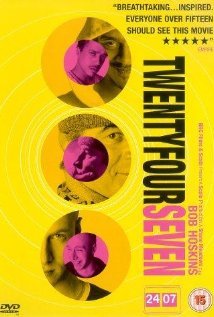“Idealism Has a Glass Jaw”

| None | Light | Moderate | Heavy | |
|---|---|---|---|---|
| Language | ||||
| Violence | ||||
| Sex | ||||
| Nudity |
What You Need To Know:
Hoskins gives an Oscar-worthy performance as the likable, energetic and philosophical Darcy. Director Shane Meadows fails in the final scene, however, to capitalize fully on the emotional power of this heartbreaking tragedy. His movie also doesn’t give enough interesting background information on the lives of Darcy, the youths in the boxing club or their families. This leads to a confusing story and superficial characters at times.
Content:
(B, RoRo, LLL, VV, N, DD, AA, M) Mild biblical worldview with strong elements of romanticism; 88 obscenities & 5 profanities; moderate violence in the boxing ring & a well-intentioned, naive man loses control, almost brutally killing a wicked man with his fists; natural upper male nudity, rear male nudity in one scene & bathroom scene during boxing club camp out; scenes of man in stupor after indulging in drugs & characters smoke cigarettes; man drowns his depression with alcohol; and, miscellaneous immorality such as father beating wife & belittling his son.
More Detail:
The tragic hero in this movie is an unemployed man named Alan Darcy, played by Bob Hoskins (the detective in WHO FRAMED ROGER RABBIT?). Darcy sees that the teenagers in his small town lack direction and that some of them will probably end up in prison if they don’t turn their lives around. He decides to start up the old local boxing club again to help them. One of the youths has a violent temper. Another youth spends his days high on drugs. A third youth is harassed by other teenagers because of his weight. Finally, a fourth youth named Tim is continually humiliated by an abusive father, who beats Tim’s mom when she defends her son.
Darcy is an idealistic man with a romantic world view. He believes people are essentially good and noble and that society has corrupted the young men he wants so desperately to help. Indeed, the young men respond positively to his leadership and encouragement at the boxing club. This is especially true when he takes them on an extended camp out in Wales, just before their first exhibition with another boxing club of young men.
Regrettably, during the exhibition, the youth with a violent temper is disqualified when he starts kicking and wrestling with the boxer he faces. Also, the youth with the drug problem becomes disheartened when he loses his own bout. Finally, when it comes time for Tim to face his opponent, Tim’s wicked father, who has been taunting Darcy throughout the exhibition, stops the fight from starting. He doesn’t want his son participating in any boxing match, mostly because, the movie suggests, he is jealous of Darcy’s influence on Tim. A melee breaks out. The fighting ends when Darcy and other people manage to toss the father outside. Alone outside, Darcy confronts the father. The father continues to taunt Darcy. Darcy punches the father. Bloodied, the father taunts Darcy again, this time for not practicing what he preaches. Frustrated by the man’s stubbornness and knowing that Tim’s father has ruined the whole exhibition, Darcy loses complete control and beats the father mercilessly until Tim pulls Darcy off his dad before Darcy can kill him.
The next two scenes are revealing. We see Darcy sitting alone in his apartment and sadly drinking one whiskey after another. Meanwhile, the boys at the boxing club set the boxing ring on fire. They are obviously disillusioned by their hero’s fall from grace.
Years later, Tim finds Darcy lying near death in a drunken stupor by the railroad tracks. Tim takes Darcy to his home and puts him to bed, where Darcy quietly passes away. Tim then calls all the youths from the boxing club to the funeral, where they all sit for a few minutes and then leave. Even Tim’s father comes to sit at the back of the tiny church. Although the boys all seem to have straightened themselves out, and some even have families, the funeral service is without hope, except that Tim seems to have a brief friendly reunion with his father, who looks as if he has a tiny flicker of remorse for the evil way in which he dashed Darcy’s hopes.
The scene in TWENTYFOURSEVEN of Darcy dejectedly drinking one whisky after another may haunt the memory of anyone who sees this movie for a long time. The tragedy in this story is not only that Darcy finds out that evil infects everyone, even a well-intentioned romantic like him. The tragedy is also that Darcy isn’t able to pick himself up and try to do better next time, something which he tells the youths to do.
Bob Hoskins gives an Oscar-worthy performance as the likable, philosophical Darcy. He imbues Darcy’s sunny disposition with a lively energy that is a joy to watch, especially during the humorous parts of the movie. Darcy’s amiability heightens the sense of tragedy at the end when we see that Darcy’s spirit has been broken completely by the realization of his own failings.
Director Shane Meadows, who also co-wrote the black-and-white movie, shoots his movie in a realistic style reminiscent of England’s “kitchen sink” dramas of the 1950s and early 1960s. He gives TWENTYFOURSEVEN a fine aura of time and place, but his movie doesn’t give enough interesting background information on the lives of Darcy, the youths in the boxing club or their families. This leads to a confusing story and superficial characters at times.
Also, Meadows seems to waste his opportunity with the funeral scene, which doesn’t go anywhere but just ends anticlimactically. Why would all these people gather at Darcy’s funeral if all they’re going to do is just sit there a few minutes and then leave? One wonders if Meadows is afraid to milk the ending for the emotional payoff he has already set up with Tim’s phone calls to the boxing club members. Perhaps, Meadows doesn’t want anyone to accuse him of being overly sentimental.
Thus, TWENTYFOURSEVEN is another disappointing effort from the independent film community, which seems to be out of touch with the vast moral audience. That audience is looking for meaningful, redemptive adult movies without the cynicism, foul language, violence, and sex of today’s youth culture. It is not looking for 1990’s neo-realism that is scared of traditional storytelling techniques and messages.


 - Content:
- Content: 

